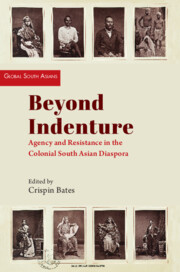Book contents
- Frontmatter
- Dedication
- Contents
- List of Figures and Tables
- Acknowledgements
- Introduction
- I Agency and Resistance
- 1 Negotiating Power in Colonial Natal: Indentured Migrants in Natal, 1860–1911
- 2 Stewed Plums, Baked Porridge and Flavoured Tea: Poisoning by Indian Domestic Servants in Colonial Natal
- 3 Labour Resistance in Indenture Plantations in the Assam Valley
- 4 A Forgotten Narrative of the Satyagraha Campaign: The Treatment of Prisoners between 1907 and 1914
- 5 Toilers across the Seas: Racial Discrimination and Political Assertion among Sikhs in Canada
- II Remigration
- 6 The Remigration of Hindostanis from Surinam to India, 1878–1921
- 7 Not So Anchored: The Remigration of Indians within the Caribbean Region
- 8 On the Move: Remigration in the Indian Ocean, 1850–1906
- III Gender and Family
- 9 Intimate Lives on Rubber Plantations: The Textures of Indian Coolie Relations in British Malaya
- 10 Labouring under the Law: Exploring the Agency of Indian Women under Indenture in Colonial Natal, 1860–1911
- 11 Gujarati ‘Passenger Indians’ in the Eastern Cape since 1900: Business, Mobility, Caste and Community
- 12 The Eurasian Female Workforce and Imperial Britain: Harnessing Domestic Labour by People of Mixed Racial Descent
- IV Legacies
- 13 After the Long March: Colonial-Era ‘Relief’ for Burma Indian Evacuees in Visakhapatnam District, 1942–1948
- 14 Opposing the Group Areas Act and Resisting Forced Displacement in Durban, South Africa
- 15 Indo-Fijians: From Agency to Abjection
- 16 New and Old Diasporas of South South Asia: Sri Lanka and Cyber-Nationalism in Malaysia
- About the Contributors
- Index
3 - Labour Resistance in Indenture Plantations in the Assam Valley
Published online by Cambridge University Press: 31 December 2023
- Frontmatter
- Dedication
- Contents
- List of Figures and Tables
- Acknowledgements
- Introduction
- I Agency and Resistance
- 1 Negotiating Power in Colonial Natal: Indentured Migrants in Natal, 1860–1911
- 2 Stewed Plums, Baked Porridge and Flavoured Tea: Poisoning by Indian Domestic Servants in Colonial Natal
- 3 Labour Resistance in Indenture Plantations in the Assam Valley
- 4 A Forgotten Narrative of the Satyagraha Campaign: The Treatment of Prisoners between 1907 and 1914
- 5 Toilers across the Seas: Racial Discrimination and Political Assertion among Sikhs in Canada
- II Remigration
- 6 The Remigration of Hindostanis from Surinam to India, 1878–1921
- 7 Not So Anchored: The Remigration of Indians within the Caribbean Region
- 8 On the Move: Remigration in the Indian Ocean, 1850–1906
- III Gender and Family
- 9 Intimate Lives on Rubber Plantations: The Textures of Indian Coolie Relations in British Malaya
- 10 Labouring under the Law: Exploring the Agency of Indian Women under Indenture in Colonial Natal, 1860–1911
- 11 Gujarati ‘Passenger Indians’ in the Eastern Cape since 1900: Business, Mobility, Caste and Community
- 12 The Eurasian Female Workforce and Imperial Britain: Harnessing Domestic Labour by People of Mixed Racial Descent
- IV Legacies
- 13 After the Long March: Colonial-Era ‘Relief’ for Burma Indian Evacuees in Visakhapatnam District, 1942–1948
- 14 Opposing the Group Areas Act and Resisting Forced Displacement in Durban, South Africa
- 15 Indo-Fijians: From Agency to Abjection
- 16 New and Old Diasporas of South South Asia: Sri Lanka and Cyber-Nationalism in Malaysia
- About the Contributors
- Index
Summary
The Growth of the Tea Industry
The tea industry was the earliest commercial enterprise established by private British capital in the Assam Valley in the 1840s. It grew spectacularly during the last quarter of the nineteenth century and continued to expand in the first half of the twentieth century. Tea production increased from 6,000,000 pounds in 1872 to 75,000,000 pounds in 1900, and the area under tea cultivation expanded from 27,000 acres to 204,000 acres. From the mid-1860s, labour for the Assam Valley plantations was mobilised under the indenture system. Employment in the Assam Valley tea plantations increased from 107,847 employees in 1885 to 247,760 in 1900. At the end of colonial rule, the Assam Valley tea plantations employed nearly half a million labourers out of a total labour population of over three quarters of a million, more than 300,000 acres were under tea cultivation (with a million acres under the control of the tea companies) and 397 million pounds of tea were being produced. The important features of this plantation enterprise were the monopolitic control of private British capital, production for a global market and the employment of a migrant labour force recruited and transported under indenture contracts from different parts of British India.
The Indentured Labour Regime
Having failed to ‘persuade’ the indigenous communities of Assam to work in the plantations, the planters brought labour from other parts of the Indian subcontinent. Recruitment was arranged by British managing agencies based in Calcutta through a hierarchy of local intermediaries known, for example, as arkattis and sirdars. This mobilisation was described at the time as the ‘coolie trade’. Through a process of recruitment, transportation and employment, the colonial plantation regimes transformed Indian agrarian communities into labouring ‘coolies’. During the course of this transformation, their castes and their religious, regional, social and cultural diversities were homogenised under the disparaging term ‘coolie’, which was universally used by planters in plantations around the globe and the colonial bureaucracy. Individuality was subsumed within anonymous ‘gangs’ and ‘muster rolls’ and only survived in the plantation ‘coolie lines’ for the duration of their working lives. Labourers were converted into what James Duncan has described as ‘abstract bodies … that are made docile, useful, disciplined, rationalised, and controlled sexually’.
Another common and significant feature of plantation life under the indenture regime was the immobilisation of the labour force upon arrival.
- Type
- Chapter
- Information
- Beyond IndentureAgency and Resistance in the Colonial South Asian Diaspora, pp. 62 - 84Publisher: Cambridge University PressPrint publication year: 2024

